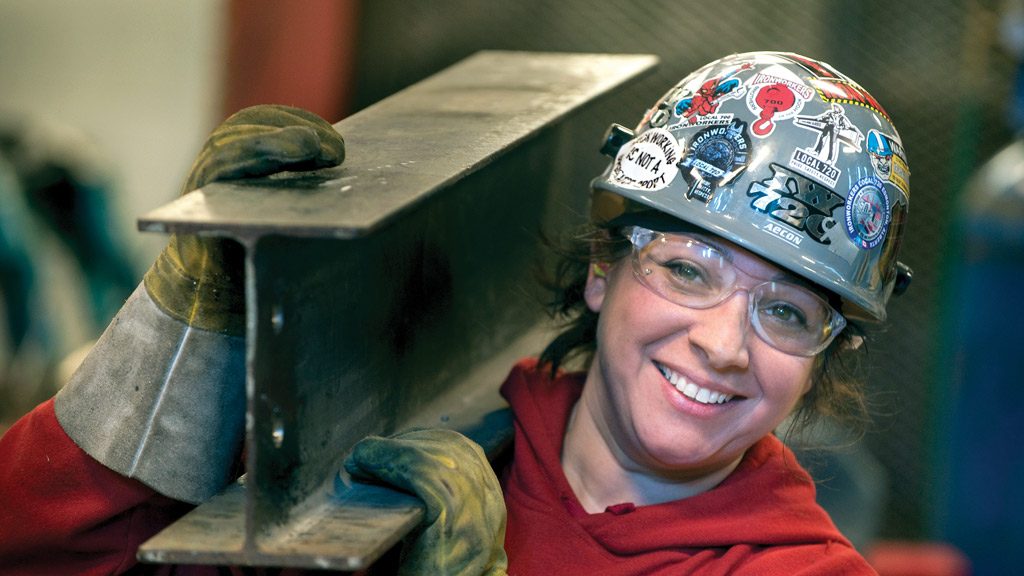
Cara Wilson has been a farmhand, worked for Canada Post, drove a school bus and even tended bar at strip clubs. As a bank teller once she was held up at gunpoint.
“There’s not a job I did not do,” says the 43-year-old single mom.
These days Wilson is “walking the sky” as an ironworker — a job like no other and one she is passionate about sticking to.
It came about after the 5’2” mother of five with “a respectful fear of heights” attended a job information session organized by Edmonton-based Women Building Futures (WBF), a non-profit society that helps women needing a chance launch careers in building trades through training and mentorship initiatives.
It was there that she heard the moniker “king of the trades” applied to ironworkers. That and the trade’s reputation for grit, hard work, pride, “fierce independence” and teamwork clinched it for her.
“I knew it was for me,” Wilson says, signing up immediately for the four-week Ironworker Readiness class offered through WBF in partnership with Ironworkers Apprenticeship and Training Plan (Local 720 in Edmonton) and the North West Redwater (NWR) refinery project.
Theory and a good dose of practical — erecting an iron structure — were part of the curriculum which also included a segment on what to expect working in a male-dominated world.
“That was a no-brainer for me because I am used to being one of the boys.”
Wilson stuck it out and moved onto work at a refinery project in Sturgeon County, Alta., where the owners had made a priority of recruiting and retaining women in the trades. Placed with a journeyperson, she completed the requisite 1,500 hours for the first year of a four-year apprenticeship program. The job included putting in stairs, reaming holes, rigging, crane signaling and partaking in laydowns “where you learn all the components that build your structure.”
First year apprentices don’t normally get off the ground but Wilson did, doing “some bolting up” and “beam walking. I got a flavour for what the work is like.” The shifts were long and she worked 12 days on, two days off.
She says meeting the challenge of ironworking isn’t just about being able to handle the physical nature of the job.
“You have to use your head,” explained Wilson.
At times, ironworkers have to “MacGyver things” because some details in engineering drawings are vague or prove impractical on the job.
“You have to make a way to make things fit.”
The diminutive woman says her height hasn’t gone against her.
“There are places where I can fit where tall guys can’t,” Wilson says, adding that doing the work safely is always a priority.
“When you are up there walking the sky, you want to go home alive and you want your partner too as well. You depend on each other.”
Wilson will be going back to school for her second year apprenticeship in September. From her experience in first year and what she’s heard about the second it will be an intense six weeks, she says, because class time is crammed with information you are required to learn in a short period.
Her goal is to get a generalist ironworker ticket by 2020. That certification covers structural/ornamental work as well as rebar.
“I am going for the long haul (the four-year program) because you are more employable and you don’t take a pay hit when you have to take a job tying rebar (if you are a generalist).”
Some day when she tires of working on iron Wilson eyes a job as instructor in the field.
“I love teaching people and, my God, I’m in my 40s.”
She advises women thinking about a career in ironwork to give it a try — if they are willing to meet the physical and mental challenges.
“You have to have a good work ethic.”
Wilson adds that she has a saying: “If you have a cold, tough it up buttercup. Take Dristan and get back on the iron.”
Moreover, having a thick skin is essential “so that you can banter with the boys. You are not there to change the culture — you are there to work.”
Read the story on ConstructConnect.